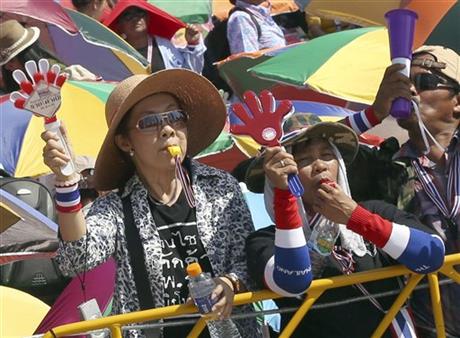 By GRANT PECK and JINDA WEDEL
By GRANT PECK and JINDA WEDEL
Anti-government protesters wave clapping tools and blow whistles during a rally at the Democracy Monument in Bangkok, Thailand, Sunday, Jan. 12, 2014. Thailand’s capital is bracing for traffic chaos as anti-government demonstrators plan to occupy major road intersections in what they describe as an effort to shut down the city. (AP Photo/Apichart Weerawong)
Thailand Politics
An anti-government protester holds a national flag during a speech from the stage during a rally at the Democracy Monument in Bangkok, Thailand Sunday, Jan. 12, 2014. The protesters want caretaker Prime Minister Yingluck Shinawatra to resign and her government replaced by a non-elected interim administration which will implement reforms they say are needed to stop corruption and money politics. The banner in foreground reads: “Resident of Koh Pa-ngan.” (AP Photo/Apichart Weerawong)
Thailand Politics
Anti-government protesters have an afternoon chat under beach umbrellas during a rally at the Democracy Monument in Bangkok, Thailand Sunday, Jan. 12, 2014. Thailand’s capital is bracing for traffic chaos as the demonstrators plan to occupy major road intersections in what they describe as an effort to shut down the city. (AP Photo/Apichart Weerawong)
Prev 1 of 3 Next
BANGKOK (AP) — Residents of Thailand’s congested capital are bracing for worse traffic chaos than usual, with anti-government demonstrators planning to occupy major intersections Monday in what they describe as an effort to shut down Bangkok. There is concern that violence may ensue and possibly trigger a military coup.
The protesters are trying to force caretaker Prime Minister Yingluck Shinawatra to resign and have her government replaced by a non-elected interim administration to implement reforms they say are needed to stop corruption and money politics. They want to scuttle an early general election called by Yingluck for Feb. 2.
Since November, the demonstrators have engaged in street battles with police, cut off water and electricity to national police headquarters, and occupied for a time the compounds of other government agencies. There have been at least eight deaths associated with the political unrest.
The protest leaders said last week that the demonstrators would occupy seven key intersections Monday in Bangkok, a city known for its debilitating traffic jams. They’re also threatening to occupy government office compounds.
Deputy Prime Minister Surapong Tovichakchaikul said Friday that a combined force of around 12,000 police officers and 8,000 soldiers was being deployed to maintain order in the capital.
Protest leaders have said they will maintain their “shutdown” of Bangkok for weeks, or until they obtain their goal. Their recent demonstrations have drawn up to 150,000-200,000 people at their height. The attacks on government installations have been carried out by young men armed with home-made weapons.
The protesters’ attempt to destabilize the country has been assisted by the opposition Democrat Party, which is boycotting the February elections. The main protest leader is a former senior Democrat leader, Suthep Thaugsuban, who served at deputy prime minister in the party’s 2008-2011 government.
The current crisis dates back to 2006, when mass protests calling for then-Prime Minister Thaksin Shinawatra — Yingluck’s brother — to step down because of alleged corruption and abuse of power led to a military coup. Since then, supporters and opponents of Thaksin have vied for power, sometimes violently.
The protesters claim that billionaire Thaksin continues to manipulate Thai politics though his sister by using his wealth to buy elections.
Thaksin, however, commands overwhelming support in Thailand’s less well-off rural areas, where voters are grateful for his populist programs, such as virtually free health care. He and his allies have won every national election since 2001.
Concern about a coup is high because of the army’s history of intervening in politics. Army commander Gen. Prayuth Chan-ocha has refused to rule out the possibility of a military takeover.
Another deputy prime minister, Pongthep Thepkanjana, said Friday that be believed the army had learned a lesson from the 2006 coup — which ended up polarizing Thailand rather than pacifying it — and that the international community and many Thais would be opposed to a military takeover.
The grass-roots pro-Thaksin Red Shirt movement, closely allied to Yingluck’s Pheu Thai Party, has said it will mobilize its supporters to fight any coup.
Most Bangkok residents, however, have more practical concerns. The U.S. Embassy on Friday issued a warning that said the demonstrations “can result in significant traffic disruptions and delays.”
“We advise you to plan ahead,” said the notice, posted on the embassy’s website. “It is prudent to ensure you have a week’s supply of cash, keep your mobile communications devices charged and stock a two-week supply of essential items, such as food, water and medicine.”
Thai authorities have dismissed the advice as overly cautious.


